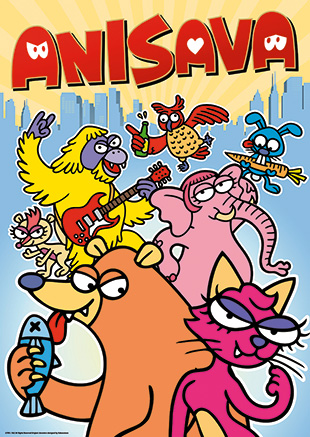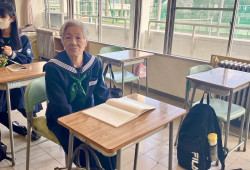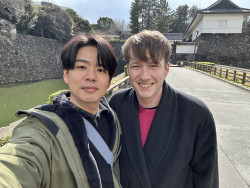
Originally published on metropolis.co.jp on March 2014

Founded by a former Sony Pictures man, Dream Link Entertainment (DLE) is Japan’s most influential Flash animation studio, known for its Secret Society Eagle Talon about a blundering but well-meaning shadow organization that wants to conquer the world. Which, in some way, says a lot about DLE. The studio has long looked overseas, and with its new adult, all-English web series, Anisava, is making its boldest play yet. We spoke with director Benpi Neko (“Constipated Cat”) about the mechanics of international anime collaboration and the challenge of writing comedy for a worldwide audience.
How was Anisava conceived?
The show’s characters were originally designed by a Spanish company called Kukuxumusu. The team’s first thoughts about the characters were that—despite being animals which are usually associated with kids’ shows—these designs were very adult. That got us thinking maybe we should do a show for an adult audience. I took the characters out of the traditional forest setting and put them in a big city, so we could play with the idea of these animal characters doing very human things: living and loving in the metropolis.
Was it originally created as an international production? If so, why?
The idea was always to have it be a production that crosses borders. Having animal characters really makes that a lot easier. If you’ve got human characters, no matter what, people can see that character’s nationality at a glance. And that might alienate some watchers, especially if they feel their culture is being misrepresented. So we’ve got characters with no particular nationality, no particular culture and we’ve got them in a big city—it could be New York, Tokyo or somewhere in Europe or Asia. It’s deliberately vague so viewers everywhere can project their own cultural templates onto the show. Finally, regardless of gender or nationality, everyone can relate to romantic comedy.
Tell us about the main characters.
The main character, Jake, can’t do anything right, but he’s a good guy. Then there’s Jenny, a strong female lead with big career ambitions, and for some reason, she’s been dating Jake for two years. The rest of the cast are co-workers and they’ve got their own personalities. Much of their personalities are based at least in part on what animal they are. So, we’ve got Fred the rabbit, who is a total sex machine. We’ve got David the lion, who is the company manager and a born leader. We’ve got all these diverse characters, and everyone is going to have a character they can relate to, or a character that reminds them exactly of that one friend—or that one ex.
Why did you turn to Kukuxumusu for character design and what flavor do they bring?
Kukuxumusu has a very distinctive style and they also do great animals. They have a way of getting these details that are both anatomically accurate to a specific animal and also very expressive and human. It’s pretty obvious at a glance that this is a very non-anime style, so in that sense Kukuxumusu helped provide an international flavor to the production.
The storylines are quite adult. Tell us about some of the main themes in Anisava. Originally, the idea was that we’d do a South Park-style show with animals, but it evolved into a romantic comedy sort of thing. The main themes then became about love, the everyday stresses of work, relationships, city life and how we all “go wild” once in a while.
What are some of the challenges in creating anime for the international market?
It was very difficult. Comedy doesn’t cross borders as well as other genres. So, I had to make sure we didn’t have humor that was too specific to one country or other. Our American scriptwriter, Sean and I worked very closely together, but we’d frequently disagree. We had a rule that the humor can’t be restricted to just one region’s audience. That proved a tall order for a while, but we had him come to Japan so we could work in person and things became a lot easier. Other Japanese animation companies might just localize their products by handing off a script and having it read without interacting much with the voice talent. I really felt like that is not the way to go. No matter where you go in the world, there are certain jokes and certain funny things that everybody will laugh at. If somebody suddenly takes off his shoe and starts talking into it like it’s a phone, that’s the kind of thing everybody will laugh about. I think it’s really possible to make a comedy show that people all over the world can laugh with. Animation is a perfect platform for this, because you can do things you just can’t with live action.
What have the responses been like so far?
Right now the show is, unfortunately, only playing in Japan, but our Japanese audience seems to really like it based on social network activity and viewership. I’m really anxious to see what people in other parts of the world think.
Tell us how Anisava points to the future of anime.
I think Anisava will open the door for studios to experiment with anime that doesn’t look and feel like Japanese animation. We hope it will encourage other studios to incorporate more diverse influences, like American sitcoms and things like that.







